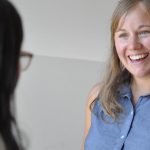Globally, approximately one third of the food produced for human consumption gets lost or wasted each year. At the same time, almost a billion people go hungry. In dollar amount, that equates to some $680 billion in losses in industrialized countries alone.
In Canada, a 2014 report suggests that number to be around $31 billion. Yet, it’s not only food and dollars that are wasted – energy, water, land and other resources along the production cycle are also un-necessarily used.
At UBC, reducing food waste is a priority within the Zero Waste Action Plan and the overall campus sustainability efforts. To address these challenges, AMS Food Services partnered with students from the Land and Food Systems (LFS) 450 course, Land, Food Community: Food Systems Sustainability, taught by Marie-Claude Fortin, and UBC’s SEEDS Sustainability Program to explore ways to reduce food waste at catered events in the Nest, the university’s new student union building.
The project team* included James Li and Yunseong Kim, students in the Faculty of Land and Food Systems, and Alix Requillart, an exchange student from Paris, France. Students evaluated food wastage through visits to the kitchen, observation of food preparation, and staff interviews. Evaluating one event, pre-consumer food preparation was not found to be a significant source of waste, however, what did contribute to food waste was the left-overs resulting from under-attendance at the event.
“To have this chance, to come for a one-semester exchange and work closely with a team and different campus groups like the AMS and SEEDS was a unique and rewarding experience,” reflects Alix. By working through the SEEDS project, students had an opportunity to see first-hand what happens behind the scenes.
“The actual amount of food waste was more than I had expected,” Yun told us. “We realized that there are significant opportunities to explore the potential of delivering high-quality food products to people in need.”
One of the recommendations that emerged, based on a survey of event attendees, was to provide attendes an option to select a serving size – small or regular. Another recommendation was to explore 1) a “green tax” deposit system through which conference planners would help fund food-redirection strategies and/or 2) an email alert system for partners.
But the project was not without challenges.
“It is a complex process to bring change to large institutions, in part because of the number of stakeholders involved. Plan ahead, be prepared, and most importantly, don’t takes things personally when they don’t go the way you thought they would.”
Overall, the project was immensely rewarding for the three and will help inform future projects that will look at how recommendations could be implemented.
“If you try to making small changes and explore ways to tackle problems within society, there are actually people who would carefully listen to your voice and provide assistance,” says Yun. “People know that food waste is an issue and our university really puts a lot of thought into what we can do to reduce that number,” James recounted. Working with the SEEDS Sustainability Program and completing this group project, students found was invaluable for their personal development.
“While different applied skills were involved, I also improved some personal attributes, as well, including self-confidence, responsibility, reliability and leadership,” Alix recounted. After talking with both the group members and the Professor, it was clear that working in collaboration with SEEDS was a rewarding venture.
“The SEEDS Sustainability Program connects 4th year undergraduate students to stakeholders, usually staff or other students in leadership positions, who want to improve the quality of the UBC food system and request help for specific initiatives. This connection allows students to work on projects which take place in their own backyard, the Point Grey campus. Students know the campus well and are very well placed to intervene in a professional manner to support these initiatives,” Marie-Claude explained.
While the project is only a starting point for further research, it’s also one of many ripples that help create a wave of change.
“Everyone benefits as students learn from experience and have the satisfaction of contributing to UBC’s food system while UBC staff benefits from the insight and work of students,” Marie-Claude shared.
*Note: The project team also included three other students: Thea Rodgers, Haley Roeser and Yasmine Yavari, who were unavailable during the compilation of this story.





